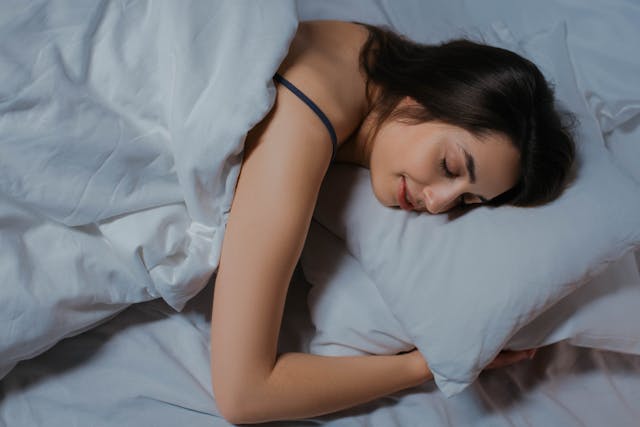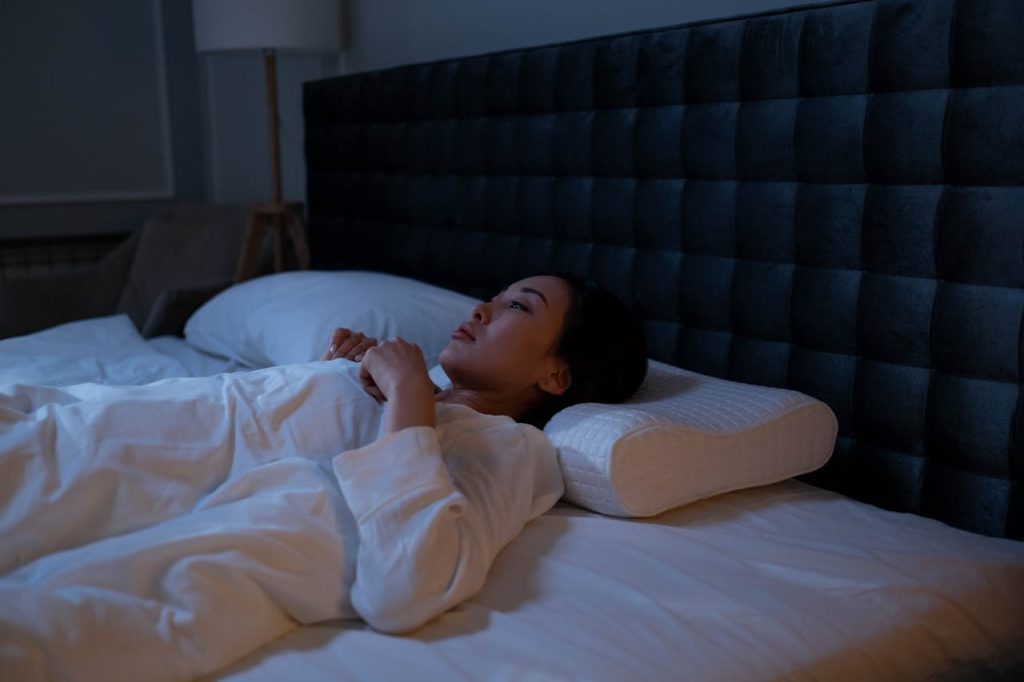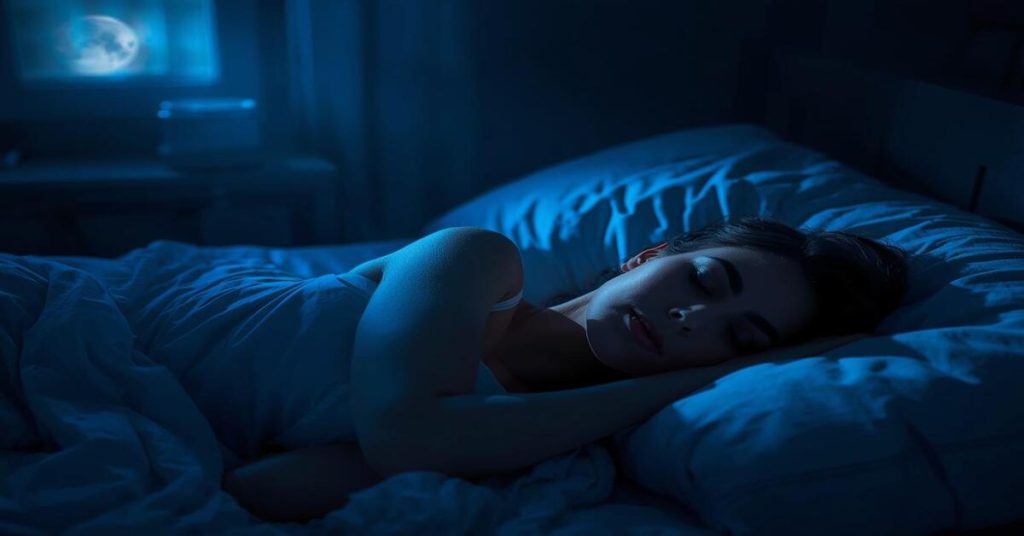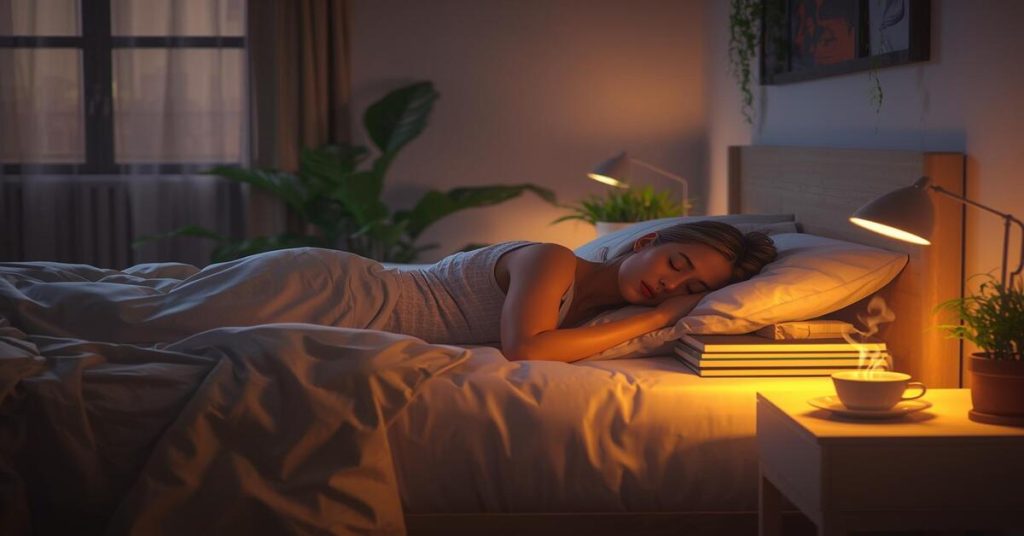Top 9 Secrets of Deep Sleep for Reducing Stress & Anxiety (Backed by Science!) 😴🧠

In today’s fast-paced world, achieving deep sleep isn’t a luxury — it’s a necessity. Whether you’re overwhelmed by deadlines or simply can’t switch off your mind at night, the quality of your sleep plays a crucial role in managing stress and anxiety. In this in-depth guide, we’ll explore the most powerful and science-backed secrets to unlocking the deep sleep benefits your body and mind crave. 💤
Why Deep Sleep Matters for Mental Wellness 🧘
Deep sleep is the stage of rest where your body and brain truly repair. It’s when your muscles rebuild, your memory processes, and your stress levels reset. Without sufficient deep sleep, your anxiety can worsen, your mind remains foggy, and your emotions may spiral. Understanding and applying the strategies below can transform your nights — and your life.
How Sleep Quality Impacts Stress & Anxiety 😟➡️😊
Poor sleep doesn’t just make you tired — it triggers a biochemical stress response in your body. Cortisol (the stress hormone) remains elevated, emotional regulation suffers, and anxiety often increases. But when you consistently achieve deep sleep benefits, your brain becomes more resilient to daily stressors.
Read more: 10 Nighttime Habits That Destroy Your Mental Peace (And How to Fix Them)
Top Secrets to Unlock Deep Sleep Benefits 🌙💫
Let’s dive into the most effective and practical techniques to promote deeper, more restful sleep — and reduce your stress and anxiety from the inside out.
1. Create a Sleep-Inducing Bedroom Environment 🛏️
Your bedroom should feel like a sanctuary. To promote deep sleep, reduce light pollution with blackout curtains, keep the temperature cool (around 18°C or 65°F), and eliminate noise. Consider a white noise machine if you live in a noisy area. Keep your space clean and clutter-free — this signals your brain it’s time to relax. A calm space equals a calm mind.
2. Stick to a Consistent Sleep Schedule ⏰
Our body operates on a natural rhythm called the circadian clock. When you sleep and wake at the same times every day — even on weekends — your body learns when it’s time to power down. A regular routine supports deep sleep benefits by making sleep onset easier and more predictable.
3. Avoid Stimulants Late in the Day ☕🚫
Caffeine, nicotine, and even alcohol can disrupt your sleep cycle. Caffeine stays in your system for up to 8 hours! Avoid these in the late afternoon and evening. Opt for herbal teas like chamomile or lemon balm instead, which are natural relaxants.
4. Power Down Digital Devices Before Bed 📵
Blue light from phones and screens interferes with melatonin production — the hormone responsible for making you sleepy. Aim to switch off devices at least 60 minutes before bedtime. Try reading a book, journaling, or listening to calming music instead. This single change can multiply your deep sleep benefits dramatically.
5. Practice Guided Meditation or Deep Breathing 🧘♀️
Mindfulness meditation and deep breathing help calm a racing mind. Apps like Calm or Headspace offer sleep-specific sessions. Even a simple breathing exercise — inhale for 4 seconds, hold for 7, exhale for 8 — can reduce anxiety and ease you into deep sleep effortlessly.
6. Optimize Nutrition for Better Sleep 🥗🌙
What you eat affects how you sleep. Try foods rich in magnesium (like almonds, spinach, and bananas) and melatonin (such as cherries or oats). Avoid heavy or spicy meals within 2–3 hours of bedtime. A light, sleep-supporting snack can help balance blood sugar and improve sleep depth.
7. Get Regular Physical Activity During the Day 🏃♂️
Exercise reduces anxiety and improves sleep quality. Just 30 minutes of moderate exercise like walking or yoga can boost deep sleep benefits at night. However, avoid intense workouts right before bed as they may increase alertness temporarily.
8. Journaling to Release Mental Clutter 📝
Before bed, write down what’s on your mind — worries, tasks, or reflections. This helps offload mental pressure and reduces nighttime rumination. Even 5 minutes of journaling creates space in your mind for true relaxation and deeper sleep.
9. Consider Natural Sleep Aids (With Caution) 🌿
Melatonin supplements or natural herbs like valerian root and ashwagandha can support sleep, especially during high-stress periods. Always consult a healthcare provider first. When used mindfully, these tools may enhance your ability to tap into the full deep sleep benefits.
Read more: 10 Breathing Exercises That Help You Sleep Faster and Reduce Stress Naturally
How Deep Sleep Transforms Emotional Balance 😌💤
One of the most underrated deep sleep benefits is its impact on emotional stability. When you’re well-rested, you’re less likely to feel irritated, anxious, or overwhelmed by minor setbacks. Deep sleep helps regulate the amygdala — the part of your brain responsible for emotional responses. So, after a restful night, your emotional resilience increases, making it easier to manage daily stress and anxiety with grace.
The Connection Between Deep Sleep and Brain Detox 🧠🧼
During deep sleep, your brain undergoes a powerful cleansing process through the glymphatic system. This natural detox mechanism removes toxins, metabolic waste, and proteins linked to neurodegenerative diseases like Alzheimer’s. Consistently experiencing deep sleep benefits allows your brain to stay sharp, focused, and stress-free. Think of it as a nightly shower for your mind.
How Deep Sleep Supports Hormonal Harmony 🌙⚖️
Stress and anxiety are deeply connected to hormonal imbalance — especially cortisol and melatonin. Deep sleep reduces excess cortisol while allowing melatonin production to flow smoothly. This hormonal harmony results in less tension, improved digestion, and even better skin. Yes, the deep sleep benefits go far beyond rest — they influence every cell in your body!
The Role of Deep Sleep in Strengthening Immunity 🛡️😴
When you’re stressed, your immune system suffers. Deep sleep is the repair mode your body desperately needs. During this stage, cytokines — proteins essential for immune defense — are released. With regular, quality sleep, your body can fight off viruses, heal faster, and remain more resilient against illness and emotional burnout.
Read more: 10 Powerful Morning Habits for Better Sleep and Mental Health
Deep Sleep and Heart Health: The Hidden Link ❤️🫀
Chronic stress is harmful to your cardiovascular system. But did you know that deep sleep lowers blood pressure, reduces inflammation, and gives your heart a true break? Achieving the full range of deep sleep benefits means giving your heart a chance to beat more efficiently and rest more deeply — which helps prevent long-term heart issues and anxiety-triggered palpitations.
How Deep Sleep Strengthens Memory & Learning Capacity 🧠📚
Have you ever noticed how forgetful or foggy you feel after a restless night? That’s because deep sleep is when your brain consolidates memories and integrates new information. Whether you’re a student, a professional, or simply trying to stay mentally sharp, one of the key deep sleep benefits is improved cognitive function and focus throughout the day.
Reducing Nighttime Anxiety with Pre-Sleep Rituals 🌿📖
Establishing a calming ritual before bed is crucial to reduce sleep anxiety. Try sipping warm herbal tea, dimming the lights, writing in a gratitude journal, or stretching lightly. These routines signal to your nervous system that it’s safe to relax, helping you transition into deep sleep smoothly. The consistency of pre-sleep rituals can gradually eliminate sleep-onset stress and anxiety.
Why Deep Sleep Is More Important Than Sleep Duration ⏳😴
Many people focus only on getting “8 hours of sleep” — but the quality matters more than the quantity. You could sleep for 9 hours and still wake up groggy if you didn’t reach the deep stages of sleep. Prioritizing the habits that lead to deep sleep benefits — such as reducing light exposure, managing stress, and maintaining a healthy routine — is more impactful than chasing total hours alone.
Social Media, Sleep Disruption & Anxiety 🤳➡️😰
Late-night scrolling not only disrupts melatonin but also triggers comparison stress and emotional overstimulation. Your mind needs peace to ease into sleep. Turning off social media at least one hour before bed can protect your mental well-being and support deeper sleep. This habit alone can multiply your deep sleep benefits and leave you waking up calmer and clearer.
Simple Lifestyle Shifts to Maximize Deep Sleep Benefits 🔄🌜
- ☀️ Get natural sunlight during the day to align your circadian rhythm
- 🍽️ Eat dinner 2–3 hours before bedtime
- 📚 Switch your phone for a book after 9 PM
- 🛀 Take a warm bath or shower before bed
- 📅 Keep a worry journal to offload concerns
Each of these micro-habits can snowball into a major transformation over time. The key is consistency. Your body loves routine — and routine invites restorative, deep sleep.
Read more: 10 Powerful Sleep Habits That Can Change Your Mental Health Forever
Frequently Asked Questions (FAQs) 🙋♀️🛌
1. What is deep sleep and why is it important?
Deep sleep is the stage of non-REM sleep where the body undergoes the most repair — physically and mentally. It’s essential for emotional balance, immune health, memory, and reducing stress and anxiety. Experiencing regular deep sleep benefits leads to overall better mental and physical wellness.
2. How many hours of deep sleep do I need each night?
Adults typically need 1.5 to 2 hours of deep sleep per night. This occurs in cycles, and quality matters more than total sleep hours. Prioritizing deep sleep over just long sleep helps your mind stay calm and resilient.
3. How can I increase my deep sleep naturally?
Follow a consistent sleep schedule, avoid caffeine late in the day, reduce screen time before bed, and create a calm sleeping environment. You can also try meditation, light evening exercise, or magnesium-rich foods.
4. Can deep sleep really help with anxiety?
Yes, deep sleep lowers cortisol levels and stabilizes mood-regulating hormones. People who experience better sleep tend to handle anxiety triggers more effectively. The mental calmness you feel after a good night’s sleep is proof of the deep sleep benefits.
5. Should I use supplements to get better deep sleep?
Natural sleep aids like melatonin, magnesium, or valerian root may help, but they should not replace good habits. Always consult a healthcare professional before starting supplements, especially if you have a medical condition or are on medication.
Final Thoughts: Make Deep Sleep Your Superpower 🌌

Achieving restful, deep sleep isn’t just about quantity — it’s about quality. By incorporating these nine secrets into your nightly routine, you not only reduce stress and anxiety but also boost your emotional resilience and mental clarity. 🧠✨
Remember, the path to better sleep isn’t a sprint — it’s a gentle journey. Start with one or two changes tonight and build from there. The more consistent you are, the more powerful your deep sleep benefits will become.
According to the Sleep Foundation, your body enters its most restorative state during deep sleep, allowing for emotional recovery and reduced anxiety. These deep sleep benefits play a key role in your long-term mental wellness. 🌙
Some sleep tracking devices claim to enhance deep sleep benefits by monitoring sleep cycles, though results may vary. Learn more on this sleep gadget review site. 🔍
Sweet dreams, and a calmer tomorrow awaits. 🌙💖



Pingback: 5 Hidden Connections Between Sleep and Emotional Balance 🌙